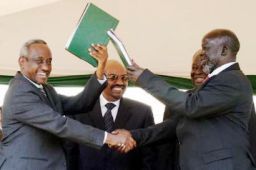The Khartoum-SPLM agreement: Sudan’s uncertain peace
NAIROBI/BRUSSELS, 25 July 2005 (ICG) — Sudan’s Comprehensive Peace Agreement (CPA) risks failure unless all parties urgently push to overcome the ruling National Congress party’s lack of political will.

|
|
Sudan’s First Vice President Ali Osman Mohamed Taha (L) and Sudan People’s Liberation Movement leader John Garang show the signed peace accord at a ceremony in Kenya’s capital Nairobi, January 9, 2005. (Reuetrs). |
The Khartoum-SPLM Agreement: Sudan’s Uncertain Peace, the latest report from the International Crisis Group, examines the CPA, which formally ended war between the Khartoum government and the insurgent Sudan People’s Liberation Movement/Army (SPLM/A), Africa’s longest civil conflict. Even though SPLM/A Chairman John Garang was sworn in as First Vice-President on 9 July 2005, implementation of the CPA lags dangerously.
“If the international community doesn’t confront the hard issues, the entire agreement could unravel, with consequences as deadly as the war that just ended,” says John Prendergast, Special Adviser to Crisis Group’s President. “Ruling party support for the southern militias must be challenged, corruption must not be tolerated, and democratic processes must be prioritised”.
The most troubling obstacle that has emerged to implementation of the CPA is lack of political will on the side of the government and its ruling National Congress Party, which realise fundamental change would necessarily come at the expense of their special interests. However, they need the peace accords and partnership with the SPLM/A in the short-term, principally to deflect international pressure over Darfur, so all other parties, including the international community, have to act quickly to take maximum advantage of this window.
Implementation by the SPLM/A has also been slow, its current snail’s pace due to overly centralised decision-making, lack of some capacities and cash flow problems. While Garang’s arrival in Khartoum signals the beginning of a new political era, it is uncertain whether the SPLM/A will be effective as a national party.
Yet another obstacle to swift implementation is the government-allied militias in the South (the SSDF), which pose an immediate and critical challenge to the SPLM/A’s plans in that region. By reaching an agreement with those militias, it can neutralise a potential spoiler and unite the South for the six-year interim period preceding the self-determination referendum the CPA promises. That could mean sharing considerable power, at least on the military side, with many former enemies.
The international community must be aware of the likelihood that the government and the National Congress Party will seek to undermine implementation in the coming months and years. It will need to help in preventing use of the SSDF as subversive proxies, in building the capacities of the SPLM/A and the new Government of Southern Sudan, and in holding all sides accountable to their commitments and timelines under the CPA.
“Six months after the signature of the CPA, there are acute problems in its implementation feeding growing frustration. The international community must ensure that Khartoum does not act to undermine the peace and it should enable the South to build viable and representative public institutions”, says Suliman Baldo, Crisis Group’s Africa Program Director.
For the full report, go at http://www.crisisgroup.org/home/index.cfm?l=1&id=3582
